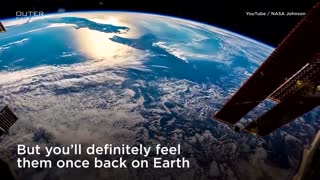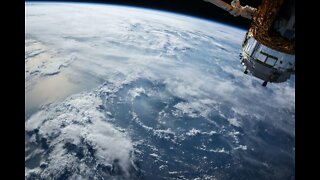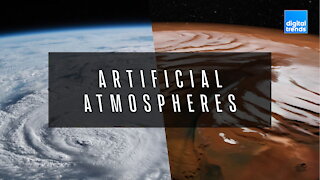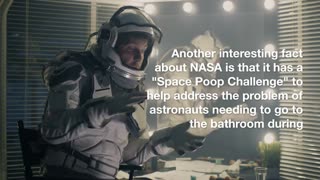What If Humans Could Breathe In Space
Space travel has always been a fascinating topic for humans. We have been exploring the mysteries of space for decades and have made significant advancements in technology to enable space travel. However, one question that often arises in our minds is whether humans can breathe in space.
The vacuum of space is a hostile environment, and our bodies are not designed to survive in such conditions. But what if humans could breathe in space? This intriguing idea is worth exploring. Would it change the way we approach space travel? Would we be able to live in space permanently? These questions and more will be explored in this video, as we delve into the science of breathing in space and the potential implications of such a scenario. So buckle up and get ready to explore the possibilities of what could be if humans could breathe in space.
Subscribe to Daily Dose Of Fact - https://bit.ly/2Z4b0m0
If humans could breathe in space, it would revolutionize space travel and exploration. Currently, space missions are limited by the need to bring along life support systems to provide oxygen and remove carbon dioxide. If humans could breathe in space, they would be able to explore farther and for longer periods of time without the need for these life support systems.
One of the biggest challenges for humans in space is the lack of oxygen. If humans could breathe in space, they would no longer need to worry about the limited supply of oxygen that must be carried aboard spacecraft. This would allow for longer missions and more efficient exploration.
However, the lack of atmosphere in space would also bring new challenges. Without the protective layer of Earth's atmosphere, humans would be exposed to harmful levels of radiation from the sun and other sources. Space suits would need to be redesigned to protect humans from these dangers.
The lack of gravity in space would also have significant effects on the human body. Without the constant force of gravity, bones and muscles would weaken over time. It is unclear how the human body would adapt to long periods of weightlessness, but it is likely that exercise and physical therapy would be necessary to maintain health and fitness.
If humans could breathe in space, it would also open up new possibilities for space colonization. Humans could potentially live on other planets or in space habitats without the need for bulky life support systems. This could pave the way for permanent human settlements in space.
However, the implications of humans being able to breathe in space are not just limited to space travel and exploration. It could also have significant impacts on life on Earth. The ability to survive in space could lead to new technologies and innovations that could be applied in a variety of fields, from medicine to energy production.
It could even lead to the colonization of other planets or even stars.
However, there would be significant challenges to overcome if humans could breathe in space. For one, the lack of air pressure would mean that humans would need to wear pressurized suits to avoid exploding due to the difference in pressure between the inside and outside of their bodies. This would also require a lot of energy to maintain, as the suits would need to be constantly pressurized.
Furthermore, even if humans could breathe in space, they would still need a source of oxygen to survive. Currently, the only way to obtain oxygen in space is through the use of artificial life support systems, which are both bulky and expensive. Finding a more sustainable and cost-effective way to produce oxygen in space would be crucial to any potential colonization efforts.
Overall, while the concept of humans being able to breathe in space may seem like science fiction, it raises some interesting questions and challenges that would need to be addressed if it were to become a reality.
If humans could breathe in space, the possibilities for exploration and discovery would be endless. Space travel would become safer and more efficient, allowing humans to reach previously unreachable destinations. Colonizing other planets and even other star systems would become a reality, paving the way for interstellar civilizations. The ability to live and work in space for extended periods of time would open up new opportunities for scientific research and development.
However, the implications of humans being able to breathe in space are not just limited to space travel. The way we live our lives on Earth would also be impacted. Space would become a new frontier for human exploration, and this could lead to new industries and opportunities for economic growth.
While the idea of humans being able to breathe in space may seem far-fetched, it is important to remember that many scientific breakthroughs that were once considered impossible have now become reality. Who knows what the future holds?
-
 4:44
4:44
Dailydoseoffact
1 year agoWhat If Humans Lived In Space Permanently
19 -
 4:06
4:06
Dailydoseoffact
1 year agoWhat If Humans Could Breathe Underwater
63 -
 0:48
0:48
Futures-vision
10 months agoWhat If Space Was Filled With Air? || #111
6 -
 3:31
3:31
HowStuffWorks_Science
3 years agoBrainStuff: What Would Space Do To The Human Body?
35 -
 1:45
1:45
OuterPlaces
6 years ago $1.76 earnedThis Is How Space Travel Affects The Human Body
1.3K -
 6:00
6:00
What If
2 years agoWhat If Outer Space Was Breathable?
49 -
 5:07
5:07
Digital Trends
3 years agoLife On Mars: How we'll create breathable air on Mars
1.73K14 -
 29:40
29:40
SpaceTime with Stuart Gary
7 months agoHumans and other mammals will be gone in 250 million years | SpaceTime S26E122
58 -
 0:54
0:54
Digital Tahir
1 year agoTop 10 Reasons We Might Never Be Able to Colonize Space Part 2
7 -
 1:19
1:19
bryceford
1 year agoInteresting Fact About Nasa
44